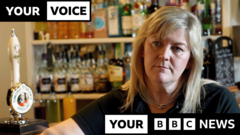Are Rising Costs Driving Pub Landlords to Closure?

The Challenges Facing Pubs in Today's Economy
In recent years, the pub industry in the UK has faced significant challenges, with many establishments struggling to remain afloat amid rising costs and changing consumer habits. This situation is exemplified by Emma Baxter, who runs The King's Head in Pollington, East Yorkshire. Despite her passion for the community and the pub, Emma is unable to draw a salary from the business, which underscores the financial strains that many pub owners experience today.
The Decline of Pubs in the UK
According to the British Beer and Pub Association, the number of pubs in the UK has been in steady decline since 2000, with approximately 15,000 pubs closing their doors in that time. In the past year alone, 289 pubs have shut down, which translates to nearly six closures every week. This trend raises important questions about the future of these vital community spaces.
Economic Pressures on Pubs
Emma’s predicament is not unique. The average price of a pint is projected to increase from £4.80 to £5.01, driven by budget measures that could lead to a loss of 9p on each pint sold if current prices are maintained. As a result, pubs will need to raise their prices significantly to maintain profitability, further complicating the already difficult financial landscape.
Impact of Rising Costs
Emma highlights that her electricity bill has doubled in the last six months, leaving her to question how she can keep the pub running. This sentiment resonates with many pub owners who have witnessed substantial increases in operational costs, from utilities to supply prices. The pandemic exacerbated these challenges, with many establishments facing a series of price hikes that outpaced previous norms.
Community-Centric Approach
For many pub owners like Emma, the motivation to run their establishments goes beyond financial gain. They often view their pubs as vital community hubs that foster social connections. Emma expresses her commitment to keeping her pub open not just for profit but for the love of the community:
- “I run the pub for the love of it and for the fact I'm a village girl,” she states.
- Emma believes that the pub serves as the center of the community, adding value beyond just food and drink.
Customer Experience and Service Quality
Despite the financial pressures, Emma insists that compromising on service quality is not an option. She understands that customers expect a welcoming atmosphere and quality service:
- “You can't turn around at 9 pm and turn all the lights off,” she explains, emphasizing the need for a comfortable environment.
- Maintaining a high standard of service is essential for attracting customers and ensuring repeat business.
Diverse Business Models in the Pub Industry
The pub industry operates under various business models, which can significantly affect their profitability and operational challenges.
Free Houses
Free houses are independently owned and are not tied to any specific brewery. This model allows owners to source their products freely, which can lead to better pricing and variety. Many free house owners find that this flexibility can help them navigate the turbulent waters of the pub industry more effectively.
Brewery-Owned Pubs
Conversely, brewery-owned pubs typically sell only the beer produced by their parent company. This model can limit the variety available to customers and often results in higher prices for the pub operators, as they have less negotiating power when purchasing stock.
Pub Companies
Finally, many pubs are owned by large corporations referred to as "pub co." In these cases, tenants often face restrictions on where they can buy their drinks, and they may also be responsible for maintenance costs. This can lead to financial strain, as highlighted by Maurice, a tenant in Sheffield:
- “The prices that we are charged for spirits and beer are ridiculous,” he notes, indicating the challenges posed by being tied to a single supplier.
- He expresses concern about the lack of support from pub companies when it comes to maintenance and repairs.
The Role of Government Support
In light of these challenges, the UK government has expressed its commitment to supporting the pub industry. Initiatives such as business rates relief and a reduction in alcohol duty on draught pints have been introduced to alleviate some financial burdens. However, many pub owners and advocates argue that more substantial measures are necessary.
Calls for Policy Changes
Paul Crossman, landlord of The Swan in York and chair of the Campaign for Pubs, advocates for a reduction in the VAT rate for the hospitality sector, suggesting it would provide significant relief to struggling businesses:
- “Getting 10% VAT from businesses that are still open is better than asking 20% from businesses that can’t sustain that,” he argues.
- This sentiment underscores the need for policy measures that can genuinely address the financial realities of running a pub.
Success Stories Amidst the Struggles
Despite the myriad challenges, there are success stories within the pub industry that provide hope for the future. Meg and Patrick recently took over the oldest pub in Chesterfield, and their experience has been largely positive:
- The couple has found success as a free house, allowing them the flexibility to curate their offerings and engage with the community.
- Patrick emphasizes the importance of community support, believing that the pub culture is too ingrained in British life to disappear.
Conclusion: The Future of Pubs
The pub industry in the UK stands at a crossroads, facing significant financial pressures while also being a cherished part of the community fabric. As pub owners like Emma and Maurice navigate these challenges, it is crucial for stakeholders, including the government and industry advocates, to work collaboratively to ensure the survival of these vital establishments.
In an era marked by rising costs and changing consumer preferences, what can be done to safeguard the future of pubs in the UK? The answers may lie in innovative business models, community engagement, and supportive legislative measures. The vitality of these local hubs depends not only on the love and passion of their operators but also on the broader societal commitment to preserving them.
FAQs
What are the main reasons for the decline of pubs in the UK?
The decline of pubs can be attributed to several factors, including rising operational costs, changing consumer habits, and increased competition from supermarkets and off-licenses. The impact of the Covid-19 pandemic has also accelerated this trend, leading to many closures.
How can pubs stay profitable in today's economy?
Pubs can stay profitable by diversifying their offerings, such as introducing food menus, hosting events, and creating unique experiences that draw customers in. Additionally, leveraging social media for marketing and fostering community relationships can enhance customer loyalty.
What support is available for struggling pubs in the UK?
The UK government has implemented measures such as business rates relief and a reduction in alcohol duty for draught pints. However, many industry advocates argue that further support, such as reducing VAT for hospitality, is necessary to sustain these establishments.
As the pub industry faces unprecedented challenges, what measures do you believe should be taken to ensure its survival? #SupportLocalPubs #PubLife #CommunityHubs
Published: 2025-07-11 16:23:15 | Category: technology



